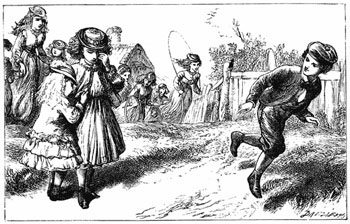Baa, baa, black sheep,
Have you any wool?
Yes, sir, yes, sir,
Three bags full;
One for the master,
And one for the dame,
And one for the little boy
Who lives down the lane
This classic nursery rhyme has attracted recent controversy as it was believed to be politically incorrect, but most scholars agree that it has little to do with the slave trade. The most common conclusion is that it’s actually about the Great Custom, which was a tax on wool in the 13th century. Under the new taxes the price of a sack of wool was split between the farmer, king and church. It takes on sinister connotations if you consider that the original last line was ‘And none for the little boy who cries down the lane’, indicating that the poor shepherd boys were left with no profits due to the heavy tax.
2. Georgie Porgy
Georgie Porgy pudding and pie
Kissed all the girls and made them cry
When the boys came out to play
Georgie Porgy ran away
Although it hasn’t been confirmed, there are a number of historical figures who could be the ‘Georgie’ in question in this rhyme. One popular interpretation is that the rhyme relates to George Villiers, 1st Duke of Buckingham who possibly had a homosexual relationship with James I and was bestowed with a multitude of titles from the monarch. However, there were also many rumours that he seduced many ladies of the court, the ‘running away’ fits nicely with his skill for avoiding confrontation for his actions. Another option is George IV, who was often mocked for his large size and fondness for the opposite sex. George’s cowardice was also legendary, despite being an avid knuckle-boxing fan.
3. Lucy Locket
Lucy Locket lost her pocket
And Kitty Fisher found it
Not a penny was there in it
Only a ribbon around it
Like most nursery rhymes, the origin story of this classic rhyme is disputed, but if true it tells a very dark story. It is possible that Lucy and Kitty were actually real people and not just that; they were 18th-century prostitutes. The ‘pocket’ is believed to refer to one of Lucy’s lovers who she dropped when he ran out of money. Kitty was quick to swoop her rival’s lover up despite his lack of funds. The ‘ribbon’ refers to the common method that prostitutes used to keep their money safe – by a ribbon tied around their thigh.
Pick up a copy of All About History to indulge all your historical curiosities.

